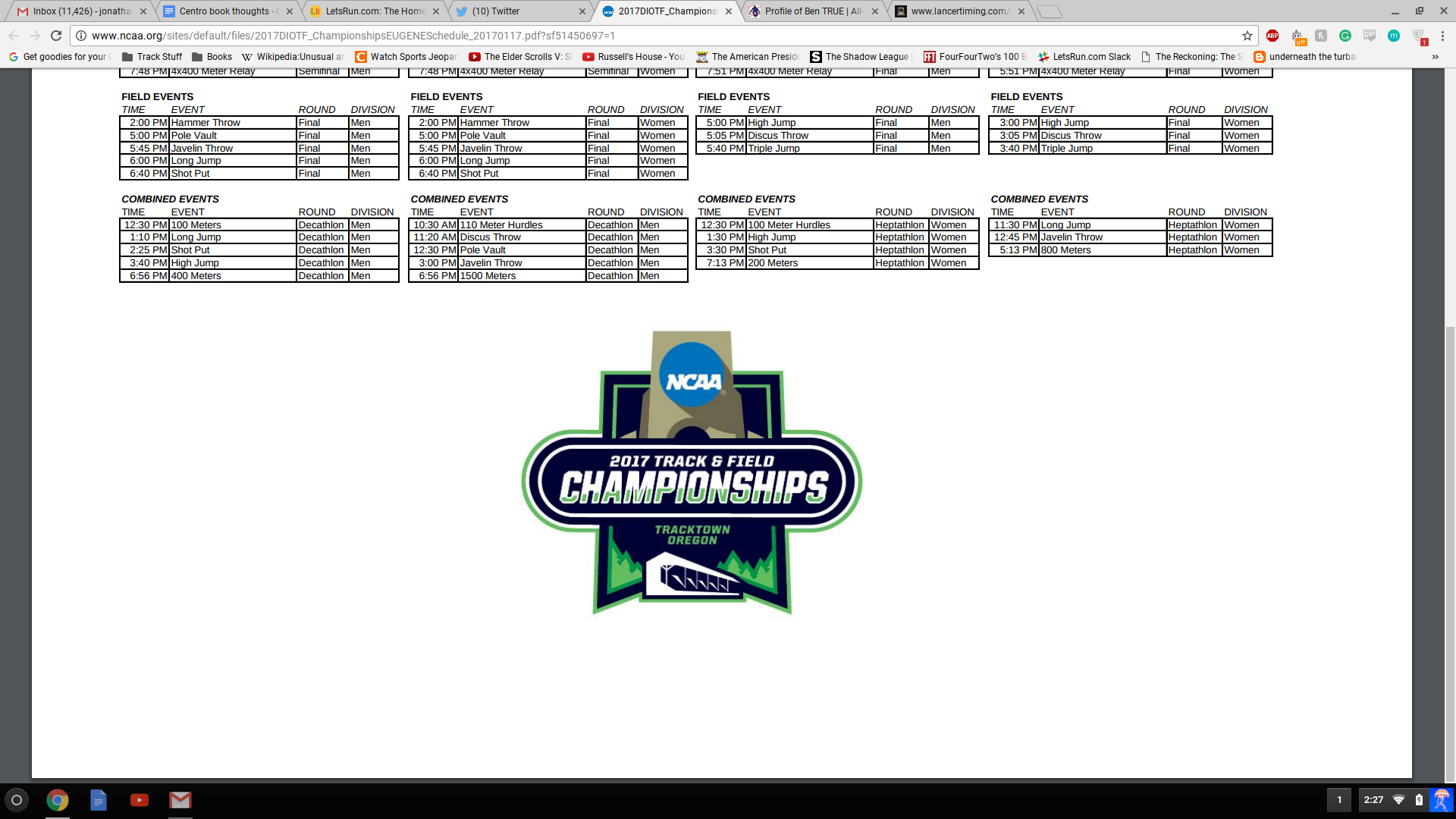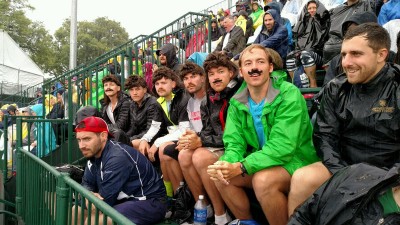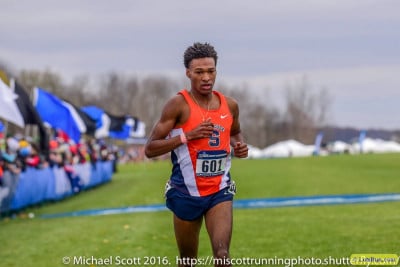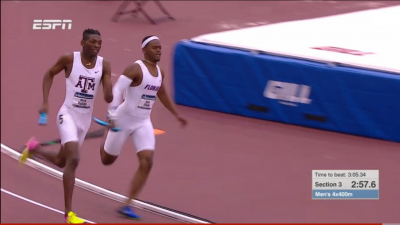The Fan’s Guide to 2017 NCAA Men’s Outdoor Track and Field Champs: The Athletes & Races You Need to Know This Week
By LetsRun.com
June 5, 2017
The NCAA Outdoor Track & Field Championships is annually one of the best track meets on U.S. soil. Because the vast majority of U.S. Olympians (not to mention countless Olympians from other countries) come through the NCAA system, it’s a chance to see the stars of tomorrow break out. Or in the case of an exceptional talent such as Texas A&M 400-meter runner Fred Kerley, it’s the chance to see the stars of today.
Once again, the meet — which runs Wednesday through Saturday and will be held at Hayward Field in Eugene, Oregon, for the fifth year in a row — is loaded with talent, and we’ll be on-site in Eugene all week providing coverage. And while all U.S. track fans should watch the NCAAs, we know it’s quite possible that you haven’t been following the collegiate action all season. That’s where we come in. Below, we’ve prepared a fan’s guide to the meet where we give you the scoop on all the top events and athletes to watch. Watching track is much more fun when you know what to watch for, so do yourself a favor and read this preview. We begin with the men below; our women’s preview is coming later in the week.
Schedule/results * TV/streaming information * Men’s entries
Is Christian Coleman the best sprinter in the United States?
Coleman, a junior at Tennessee, has already established himself as the best sprinter in the NCAA. In March, he swept the 60 and 200 at NCAA indoors, tying the collegiate record of 6.45 in the former event and missing the collegiate record of 20.11 in the latter by just one-hundredth of a second. He has kept that rolling outdoors as he hasn’t lost a single race all season. Here are just a few of the incredible feats the 5-foot-9 Coleman has managed this spring:
- Ran 4.12 in the 40-yard dash. That would have broken the NFL Combine record by a full tenth of a second.
- Became just the eighth man in history (and, at 21, the youngest ever) to break 10.00 in the 100 and 20.00 in the 200 on the same day, winning both events at SECs.
- Ran 19.85, the second-fastest collegiate 200 ever, into a headwind at the NCAA East Preliminary round in Lexington, Kentucky.
Coleman enters NCAAs as the heavy favorite to win both the 100 and 200 at NCAAs. That’s why we’re asking if he’s the best in the U.S. — his 100 season best of 9.96 is tops in the country (and #5 in the world) while his 19.85 — again, into a headwind — is the world leader for 2017. Last year, Coleman was an Olympian in the relay after placing sixth in the 100 at the Olympic Trials. This year, he may enter USAs as the favorite in the sprints. (None of last year’s Olympians in the 100 are going great this year. Justin Gatlin has only run 10.14 this year/9.97 wind aided, Trayvon Bromell will likely run his first race of the year at USAs, and Marvin Bracy hasn’t raced since April).
FYI, the collegiate records are 9.89 in the 100 and 19.69 in the 200. The 100 isn’t totally out of the question, but Coleman’s PR (9.96) already came with a 1.7 tailwind. We think the 200 is more likely to go down if he can get a nice tailwind, but keep in mind that the 200 final (10:07 p.m. ET) is just 45 minutes after the 100 final (9:22 p.m. ET) on Friday night.
The bigger issue is the weather. It’s supposed to rain on Friday, with a high of 61 degrees. If that forecast holds, it would take a monumental run by Coleman to break a collegiate record.
The individual brilliance of Fred Kerley, Emmanuel Korir & Lindon Victor — consider yourself lucky if you get to see these future World Championship medallists compete in person
Coleman is far from the only TOTAL STUD competing at NCAAs on the men’s side this year. There are a number of big-time talents, led by Texas A&M senior Fred Kerley. In addition to being the collegiate record holder thanks to the 43.70 he ran at Regionals, Kerley is also the 7th-fastest 400 man in the history of the event.
If you had never heard of Kerley until this year (when he won NCAA indoors), you can be forgiven for your ignorance. Coming into the 2016-2017 season, the junior college transfer had never even scored individually at NCAAs. During his first year as an Aggie last year, he just ran the 4×400 relay indoors and didn’t make the final outdoors.
Just over a year ago, a poster on the Track & Field News messageboard was marveling at how Kerley improved his pb from 46.38 to 45.10 in a single race and were wondering if that was one of the biggest PRs achieved by a serious 400 runner. Now he’s all the way down to 43.70.
Kerley, who played football and basketball in high school (and did track as well), comes from an athletic family. His older brother, Jeremy Kerley, is a wide receiver/return man for the San Francisco 49ers. His younger brother Mylik, was 3rd at NCAA indoors in the 400 this year and anchored Texas A&M’s winning 4×400 team to the win that secured them the overall indoor team crown.
Kerley is one of two collegiate record holders at A&M as decathlete Lindon Victor has twice broken Ashton Eaton‘s collegiate record, taking the mark all the way up to 8539. If you are scoring 8,500+ points, you are a medal contender at Worlds/Olympics (it would have been 5th at the Olympics last year).
And we here at LetsRun.com have of course been marvelling at just what a special talent UTEP freshman Emmanuel Korir is at 800. Indoors, he set a world’s best of 1:14.97 at 600, then won NCAAs. Outdoors, he negative-split a 1:43.73. If running a negative split 1:43.73 as a freshman in college isn’t special enough, what blows us and even Korir’s coach Paul Ereng away (and Ereng is an Olympic gold medallist at 800) is how fast Korir is.
Korir has run 44.53 for the open 400 this year and he split a fully automatic 43.34 at regionals on the 4×400. No human in history has ever run under 45 in the 800 and 1:43 for 800. We certainly think Korir will be the first.
With Korir in the men’s 800, the event is worth the price of admission, but he’s far from the only good guy in the event. During the regular season, six collegians broke 1:46.00 – which we believe is the most in history. It’s certainly the most listed on the TFRRS system, which dates back to 2010.
# of Sub-1:46 Performers During the NCAA Regular Season
2017 – 6
2016 – 4
2015 – 4
2014 – 2
2013 – 0
2012 – 2
2011 – 3
2010 – 0
If Korir somehow is beaten, the winner might be one of the two other super talented underclassmen in the field. Penn State sophomore Isaiah Harris was sixth at the Olympic Trials last year as a true frosh and has lowered his pb all the way to 1:45.12 this year. Texas A&M frosh Devin Dixon won SECs and has run 1:45.71. Virginia Tech senior Drew Piazza hasn’t broken 1:46 (1:46.02) but he was the runner-up indoors.
MB: Emmanuel Korir does it – 1:43.73 negative split!!! Is he a medal favorite for Worlds and the 2nd coming of P. Ereng?
LRC Who Is Emmanuel Korir – The Freshman That Set A World’s Best in the 600m? “I Think He Could Be a World Champion in the 800”
Josh Kerr vs. Craig Engels in the 1500
Last year, we touted the 1500 as one of the races of the meet and it didn’t disappoint as Clayton Murphy put on a show, scorching a 3:36 to destroy a quality field. After the race, Murphy turned pro early (we’d say that decision is working out pretty well) but in his place, New Mexico’s Josh Kerr has emerged as the class of the NCAA.
We’ve always said that the only way to beat a stud like Edward Cheserek at NCAAs is to be a stud yourself. And that’s what Kerr did in the NCAA indoor mile, ripping a 1:51.60 final 800 to blow Cheserek away and win by over two seconds.
Athletes don’t fluke their way into wins like that, and Kerr — who is still only 19 years old — showed why he is the real deal outdoors by running 3:35.99 for 1500 at the Bryan Clay Invite, becoming just the sixth collegian to break 3:36 (and only the second in the last 22 years).
Kerr certainly enters NCAAs as the favorite, but there is one man who could challenge him: Ole Miss’ Craig Engels. After last year’s Olympic Trials, where he placed 4th in the 800 and 5th in the 1500, Engels looked set to dominate the NCAA in 2017, but he broke his clavicle over the winter in a snowboarding accident, which caused him to get a late start on the season. He’s been rounding into form outdoors, however, and he has the #2 time in the NCAA this year at 3:37.75 — though we should point out that Kerr beat him by almost two seconds in that race.
Still, Engels showed himself to be a good championship performer at the Trials and he’s the only guy in this field even close to Kerr from a talent perspective. Hopefully he can summon a performance that’s enough to at least push Kerr in Eugene.
Who will emerge as the heir to Edward Cheserek in the distance events?
The NCAA suffered a blow last month when Oregon announced that Cheserek, the winningest male athlete in NCAA Division I history (17 NCAA titles) would not compete at NCAAs due to a back injury. Cheserek dominated the NCAA so thoroughly that the distance races at nationals were often drained of drama. That won’t be the case this year as a pair of new champions will be crowned in the 5,000 and 10,000.
The 10,000 is the first track final of the entire championships on Wednesday night (10:08 p.m. ET) and the favorite there is Tulsa’s Marc Scott. The 23-year-old Brit had the #2 time in the NCAA this year (28:07) and at NCAA indoors, he was 2nd in the 5k and 3rd in the 3k. And none of the guys who beat him at NCAA indoors will be running the 10k in Eugene.
As good as Scott is, however, he’s not an overwhelming favorite like Cheserek. Alabama’s Alfred Chelanga was actually the NCAA leader at 28:04, but, including indoors, he’s only won one race in 2017 — the 10k at SECs (he was 5th in the NCAA indoor 5k, five seconds behind Scott). Butler’s Erik Peterson (28:11 sb, 6th in indoor 5k) and Middle Tennessee State’s Jacob Choge (brother of two-time World Indoor medallist Augustine) are also contenders. Choge beat Chelanga by 14 seconds in a 5k back on April 21 at Auburn.
Given his indoor success and his fast time outdoors, we’re taking Scott FTW in the 10k. He’s also entered in the 5k (Friday, 10:25 p.m. ET), but that event will be a lot tougher for him to win. Though we expect Scott to contend in the shorter race, the two men to watch are a pair of Canadian-born athletes: Justyn Knight of Syracuse and Grant Fisher of Stanford (Fisher is also an American citizen and represented the U.S. at World Juniors in 2014).
Knight put together an incredible 2015-16 season in leading Syracuse to the national title in cross country, and he’s been even better in 2016-17. In the fall, he became just one of two people to beat Cheserek at an NCAA XC championship, taking 2nd, and indoors he finished 2nd again — this time to Cheserek in the 3k. Outdoors, he’s gone undefeated, including another win against Cheserek at Payton Jordan, where he destroyed Cheserek over the final 300 to win the 5k in 13:17.51 — the sixth-fastest time in NCAA history.
Fisher, who ran 13:30 last year as a true freshman, is the only guy with a realistic chance to stop Knight. Fisher was 5th at NCAA XC before redshirting indoors, and he’s been fantastic this spring. He ran 13:37 to win handily at the Cardinal Classic on April 21 against a field that included Joe Klecker (4th NCAA indoor 3k) and John Dressel (4th NCAA indoor 5k) and won the 1500 at Pac-12s by .88. That’s a healthy margin in a 1500, but it’s gigantic in a race where the winning time was just 3:54. Fisher closed in a ridiculous 51.81 for his final 400 and 1:52.52 for his final 800, and his scalps in that race included Oregon’s Blake Haney (3rd 2015 NCAA 1500) and Sam Prakel (anchored Oregon to wins in DMR and 4xmile at Penn Relays), Cal’s Thomas Joyce (NCAA mile finalist) and Colorado’s Ben Saarel (3:38 pb). That’s some serious speed for a runner whose best event is probably the 5k.
Knight has a great kick too, of course, but he’s stronger than Fisher, so it may be to his advantage to push the pace a little bit. Knight is the favorite, but if Fisher is still in it with 200, all bets are off. It should be a fantastic race.
Can Florida’s KeAndre Bates become the 8th man in history to win the long jump and triple jump at the same NCAAs?
Casual fans may think the same person often wins the LJ and TJ at NCAAs or the 5000 and 10,000 or 100 and 200. In fact, double wins are rare. Since the 10,000 became an annual event at NCAAs in 1963, we decided to look up how often the doubles have been achieved.
In terms of the LJ and TJ double, since 1963, it’s a feat that has only been achieved 9 times by 6 different men.
The 5000 and 10,000 double is the most common as it’s been accomplished 16 times by 11 different individuals. What about the 100 and 200?
That double has been achieved 11 times since 1963 by 10 different men (Justin Gatlin is the only man to do it twice).
Bates, who is a junior at Florida, has the #1 TJ in the NCAA this year and the #2 LJ this year (indoors at NCAAs, he won the LJ and was 2nd in the TJ). TFN is predicting he’ll win both. If he does, he’ll have a shot to become only the fourth man to win the LJ and TJ at multiple NCAA outdoor championships as Bates is only a junior.
Here are the men who have swept the LJ and TJ at multiple NCAA Outdoor Championships.
Mike Conley – Arkansas – 1945 and 1985
Robert Howard – Arkansas – 1997 and 1998
Marquis Dendy – Florida – 2014 and 2015
Bates is far from a lock to win both, however. He didn’t even win the SEC outdoor LJ crown. That tile went to Missouri freshman Ja’Mari Ward, who isn’t at NCAAs as he didn’t compete at Regionals.
Who wins the team battle? Texas A&M or Florida?
The 2017 NCAA indoor meet was one of the most exciting we’ve ever witnessed, in large part due to the epic team battle between Texas A&M and Florida. In the end, it came down to the final event, the 4×400 relay, with the Aggies needing to win the race on their home track to clinch their first-ever indoor title. The race ended with Texas A&M anchor Mylik Kerley passing Florida’s Ryan Clark on the homestretch to win the race and the national title. Truly captivating.
The outdoor championships could end in similar fashion. Currently, Track & Field News is projecting Florida to edge A&M by 2 points – meaning the meet is likely to come down to the 4×400 yet again. The Aggies definitely have the edge there — they won the SEC title, while Florida was only fifth. But the Gators are the defending champions, and if they do well enough in the early events, the 4×400 may not matter in the end.
Personally, we like Texas A&M as many of their projected points seem like sure things. Barring injury, Kerley is going to win the 400, Lindor is going to win the decathlon (assuming no NH in the PV) and Ioannis Kyriazis should win the javelin as Kyriazis has thrown the javelin more than 30 feet farther than anyone else in the NCAA this year.
It’s a lot harder to screw up those events than it is to screw up a jump or hurdle race where Florida is counting on a lot of points.






